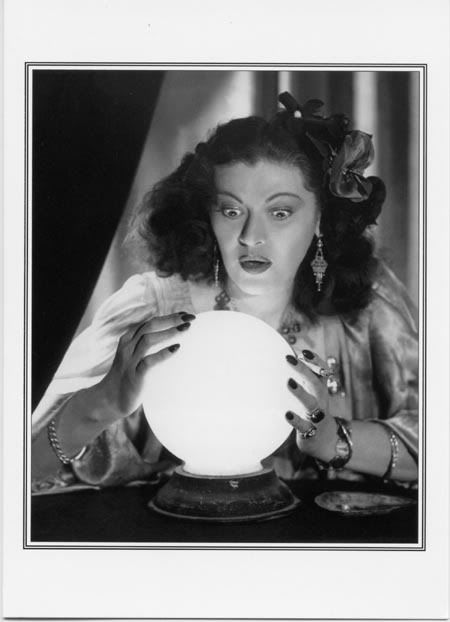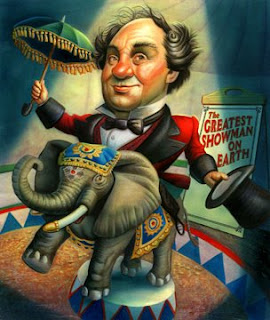Tim draws parallels between believing in horoscopes and other superstitions and "magical investment thinking." – Ilene
Your Financial Horoscope
Courtesy of Tim at The Psy-Fi Blog
 Using the latest in IP address geo-detection and profiling technology we’re delighted to bring you your personalized horoscope:
Using the latest in IP address geo-detection and profiling technology we’re delighted to bring you your personalized horoscope:
You have a great need for other people to like and admire you. You have a tendency to be critical of yourself. You have a great deal of unused capacity which you have not turned to your advantage. While you have some personality weaknesses you are generally able to compensate for them. Your sexual adjustment has presented problems for you. Disciplined and self-controlled on the outside, you tend to be worrisome and insecure on the inside. At times you have serious doubts as to whether you have made the right decision or done the right thing. You prefer a certain amount of change and variety and become dissatisfied when hemmed in by restrictions and limitations. You pride yourself as an independent thinker and do not accept others’ statements without satisfactory proof. You have found it unwise to be too frank in revealing yourself to others. At times you are extroverted, affable, sociable, while at other times you are introverted, wary, and reserved. Some of your aspirations tend to be pretty unrealistic. Security is one of your major goals in life.
Trick or treat?
 Cargo Cults
Cargo Cults
In the Second World War many remote Pacific islands found themselves occupied by warring forces. This often led to an unexpected windfall for the primitive islanders as the troops were supplied from the air with unimaginable luxuries like corned beef, custard powder and anti-aircraft guns. When the war ended and the troops went home the planes stopped coming so, naturally, the islanders hatched a cunning plan to make them come back again.
They created the rudiments of the apparatus that the ground crew had used – paddles to welcome the aircraft, fake headsets for the radio operator, fake landing lights – and engaged in the same strange ritual ceremonies, behaviour generally known as a cargo cult. Yet no matter how they adjusted the ceremony they couldn’t get it quite right and the planes never came back. It would be crass simplicity to suggest that the same kind of magical thinking pervades the world of investment. Only it does, of course.
Paranormal Beliefs
The curiously enduring nature of belief in the paranormal is one of the mysteries of the modern age. Less than 50% of the world’s population believes in evolution despite copious evidence in its favour, much of it propping up the nearest bar, yet a majority happily accept the probable existence of invisible, incorporeal and undetectable entities of which science can find not the slightest trace. This isn’t explicable under the normal definition of “rational”.
Many practitioners of magic argue that this widespread belief in things that go bump in the night is de-facto evidence that there must be something “out there”. Only almost certainly there isn’t, but there’s definitely something going on inside our heads: we’re infinitely suggestable. This factor, combined with our desire to seek forms of control in situations of extreme uncertainty is a powerful driver of behaviours that we’re apt to label as “irrational” when, in fact, they’re nothing of the sort.
When the Irrational Isn’t
The smoking gun that leads to the redefinition of “rational thinking” was discovered in the Trobriand Islands. The anthropologist Bronislaw Malinowski noticed that the islanders engaged in elaborate rituals when they went deep sea fishing but not when they were fishing inshore. He surmised that the open seas superstitions were an attempt to protect themselves from danger in a fundamentally uncertain environment.
This tendency to attempt to exert some form of control, no matter how illusory, in the face of great uncertainty, seems to be part of the human condition. Various studies, including this one on the superstitious behaviour of baseball players, back the theory up. The evidence is that people attempt, always, to put themselves in a position where they feel they have control of the situation, regardless of the reality: the so-called "illusion of control".
Magical Investment Thinking
 Now, boys and girls, can we think of another situation where people are essentially at the mercy of random and unpredictable events and spend a lot of time developing ritual behaviours to make them feel as though they have control of the unfolding events? Admittedly, the stockmarket is an extreme example of the genre – a global manifestation of a belief in magical forces leading to the mass delusion that we can predict the movements of individual stocks, markets and economies.
Now, boys and girls, can we think of another situation where people are essentially at the mercy of random and unpredictable events and spend a lot of time developing ritual behaviours to make them feel as though they have control of the unfolding events? Admittedly, the stockmarket is an extreme example of the genre – a global manifestation of a belief in magical forces leading to the mass delusion that we can predict the movements of individual stocks, markets and economies.
While primitive tribesmen have mystical seers, priests and soothsayers we have investment analysts; while they have chicken entrails, hallucinogenic drugs and animal sacrifice we have multi-year earnings forecasts, better hallucinogenic drugs and occasional executive bloodlettings. Simply clothing the magical rituals in a smart suit and a well formatted report doesn’t make the outcome any more predictable and the rituals any less pointless, but it does make us feel better when things go pear shaped and we go looking for reassurance.
Logical or Astrological?
In fact if this theory is correct we should see an increase in such magical behaviour during conditions of extreme market movements; a greater reliance on divining the future using essentially random techniques, and indeed we do. In times of uncertainty many people abandon any pretence of higher cognitive functioning and head off in search of their nearest soothsayer.
For instance, if you type “investment astrology” into Google you’ll get over 2 million hits. The survival of astrology into the modern age is itself remarkable but huge swathes of the world’s population still conduct their lives according to the prophetic divinings of invisible, undetectable and unmeasurable forces that enmesh us at birth and mark us for life. Apparently.
Yet, as has been repeatedly demonstrated, the evidence for astrology actually working is decidedly thin away from areas of human suggestability. So, for instance, those people who believe in astrology tend to have personalities that conform to their astrological signs while people who don’t, don’t. Belief is a powerful weapon in human systems but it sadly doesn’t mean that magical thinking can actually have an effect on the physical world around us.
Supernatural Stockmarkets
Only, of course, the stockmarket isn’t the real world. It’s an artefact of human construction and is therefore open to manipulation through all of the kinds of things that we let affect us. In theory the performance of stocks on the market is determined by fundamental factors like earnings, competitive advantage and marketing. In the long-run this is generally true, but in the short-term magical modes of thinking can easily overwhelm more fundamental factors.
Still, you’d assume that if astrology, charting and other magical modes of prediction were completely useless then their repeated failure would eventually persuade people to give them up in favour of something more rational like chain-saw juggling or duck weaving. However, it’s far from being that simple because we’re all subject to being fooled by a behavioural trick called the Barnum Effect.
 Roll Up, Roll Up, Get Things Wrong
Roll Up, Roll Up, Get Things Wrong
This was first demonstrated in 1949 by Bertram Forer who constructed the fake horoscope at the head of this article using the most general astrological statements he could find. He presented this to his students, explaining that it had been customised for each of them when, in fact, he gave everyone the same reading. When he asked them if it accurately represented them they virtually all agreed that it did. This trait – to see insightful information in the most general rubbish – is the stock in trade of all magicians, astrologers and other sayers of soothes:
"It was pointed out to them that the experiment had been performed as an object lesson to demonstrate the tendency to be overly impressed by vague statements and to endow the diagnostician with an unwarrantedly high degree of insight. Similarities between the demonstration and the activities of charlatans were pointed out".
Everyone is prone to the Barnum Effect and it works because we think the same way. We read into things whatever we want to: again, it’s not that there’s anything “out there”, it’s all inside our heads.
Stocks that go Bump in the Night
Cargo Cult Photo: at broken atlas.
Fortune Telling Lady Photo: Photobucket, by NicoleTurturro.
The idea that most investment is driven by magical thinking underpinned by psychological tricks like the Barnum Effect is disquieting, but once you start looking for examples it becomes all too easy to find them. Astrology is simply the most obvious outward sign of this, but sneering at astrological investment techniques while continuing to faithfully follow more orthodox but equally magical processes ignores that this is the way most of us deal with uncertainty.
For children Halloween comes once a year but many investors spend their entire lives trick or treating. Sadly most treats are just tricks and most tricks are just illusions that we fool ourselves into believing. Trouble is we can only see this with hindsight – and that’s if we ever figure it out at all.
Related articles: Science, Stocks and Superstition, O Investor, Why Art Thou Rational?, Don’t Lose Money In The Stupid Corner



